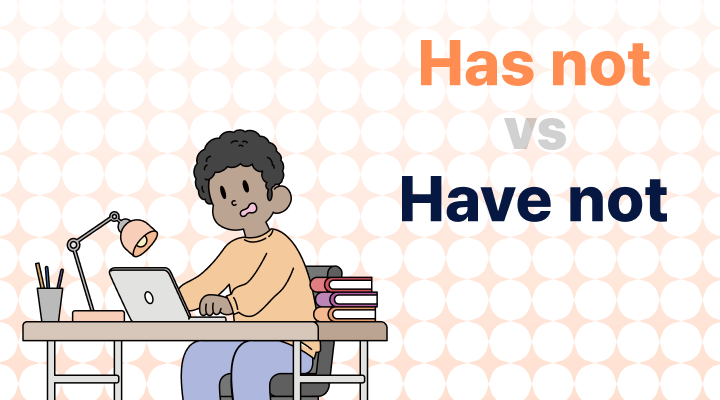They has not been going to class these days. → They have not been going to class these days.
Has or have? This is similar to the is vs. are dispute (refer to the article Is vs. Are).
Here is a simple rule to follow:
A has/have B.
- If A is singular, then use has.
- If A is plural, then use have.
An exception to this rule would be the first person I or the second person you. When using I or you, use have instead of has:
- I have been going to class these days.
- You have up to twelve chances to score.
Here are some sample sentences you can refer to:
- The proctors have the tests in their hands.
- Ethan has an announcement he would like to make at dinner tonight.
- The mirror has hooks on the back so you can hang it on the wall easily.
- The employees have weekly workshops every Thursday morning.
- Our manager said the purchase orders have to be sent in by Friday.
- Do you know if the new parking lot has charging stations for electric cars?
- The security guards all have walkie-talkies on their waists.
Now, do you want to put your understanding of has vs. have to the test?
Here are some practice questions we devised for you to try out. The answers will be at the bottom of the page.
- The cat has/have an infection on its eye.
- The twins has/have different eye colors.
- The book on the table has/have a coffee stain on it.
- Do you think Erin has/have a pen I could borrow?
- Jaguars has/have strong hind legs which help them jump high.
- We asked if the photographer has/have experience with wedding photos.
- The glass of cold water has/have condensation on the outside.
- The man with the crooked tie also has/have mismatched socks.
- The doctors at this hospital all has/have degrees from top universities.
- Are you sure your luggage has/have a lock that’s approved by the TSA?
What about when you use has or have in the beginning of a question?
- Have they no shame?
- Has he written his name down on the sign-in sheet?
Notice in the two questions above, the subject matches the plurality of has and have. They is plural which matches the plural have, and he is singular which matches the singular has.
This is the rule you can use when determining which one you need to use in the beginning of a question:
Has/have A B?
- If A is singular, use has.
- If A is plural, use have.
- Exception: If A is I or you, use have.
If you’re still lost on whether to use has or have, you can check your sentence at Engram, where our AI proofreader will tell you if your sentence is correct.

Answers to the practice questions:
- has
- have
- has
- has
- have
- has
- has
- has
- have
- has
Reference:


Cindy is a language-loving American writer for the Engram's blog. Her love for languages, including her first language English, is what drives her when she writes and translates for a living. In her spare time, she enjoys reading, badminton, The Office, watching meme videos on YouTube, and singing karaoke.













